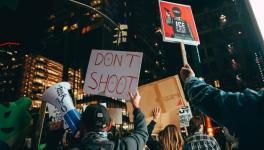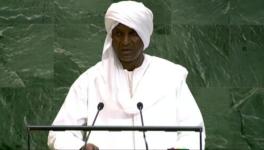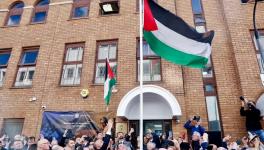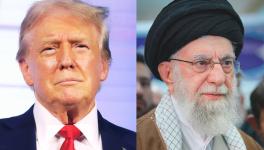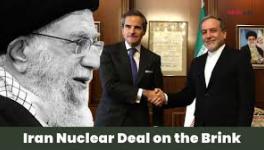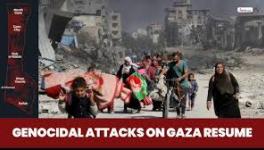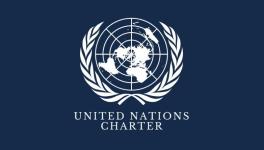'Poorly drafted UN resolution 1973 likely to prolong civil war in Libya' - Vijay Prashad
Prof. Vijay Prashad, professor of International Studies, Trinity College, Connecticut, US talks to Newsclick on the UN resolution 1973 on intervention in Libya and other issues related to the uprisings in West Asia (in Yemen in particular).
Transcript-
Prabir Purkayastha (PP) - Hello and welcome to Newsclick. Today we have with us professor Vijay Prashad and we are going to discuss the situation in Libya as it is moving. Vijay, when we look at Libya, the assumptions that a lot of people seem to have made is that a no fly zone is relatively simple. All we have to do is to proclaim that the Gaddafi shouldn’t fly his planes and that’s about it. Obviously it means action from air against his air defenses and now as it transpires the coalition has moved into taking out what it calls Gaddafi’s ground forces. How do you see this no fly zone, as it was passed in the Security Council and what it seems to have developed into?
Vijay Prashad (VP) –Well, Security Council resolution, 1973, is strictly following a cardinal aspect of UN protocol which suggests that the UN has a so called obligation to protect citizens or civilians so the initial aim of that resolution of 1973 was that all necessary measures may be taken to protect civilians. The problem is, as the African command of the US military has found, is differentiating between civilians and armed combatants or rebels, who are civilians who have taken up arms. Therefore, if the American and the French planes are to protect civilians, how do they know that they are not also protecting and helping the rebels? To protect the rebels is technically a violation of UN resolution 1973, which is just an obligation to protect civilians. So this resolution passed by the Security Council was very poorly drafted. The agenda is very unclear. Indeed the phrase “all necessary measures” has confused a lot of people. Does this simply mean a no fly zone or does this mean a no fly zone where they can attack munitions dumps, as they have done yesterday, where they can attack Gaddafi’s compound, etc. So, resolution 1973 is legally very complicated. It’s not clear. And on the ground even the American military has said that they are very confused about how to put this into operation.
PP – Vijay, if you really look at it, the fact that it is vague and poorly drafted, in fact, supports the thesis that there was a different agenda right from the beginning.
VP- Yes. That is one way to look at it. The way to understand this is if you look at the debate in the security council, the Indian representative and the Brazilian representative made precisely this point, that the wording is too vague, that there are other alternatives and that there could be a dangerous direction if the full implication of the wording is taken, which is why five countries, including India and Brazil, abstained from voting on this resolution. The other two significant abstentions were China and Russia. Nobody exercised a veto. It is also quite problematic that nobody voted against the resolution but in the Security Council an abstention is quite a serious sense of doubt about the efficacy of a resolution and this is what they had said. So it’s not the question that people were unclear going into it, what this resolution was going to be about. The warning was already put before the council before the vote and none the less the resolution passed and this is where we are today. We cannot say that we are here today because we were not warned. The warning was made inside the council not just outside by critics of so called humanitarian intervention.
PP - It is clear that Gaddafi has enough firepower to hold on to the territory that he has, so effectively, it would mean a prolonged period of civil war unless his military forces break away from him, which doesn’t seem likely at the moment. So this would seem to imply a much longer period of civil war with NATO troops who have come in today providing defense for the Benghazi alliance and this would lead to a situation of either a prolonged civil war or a future where occupation by the armed forces of the NATO countries.
VP- Yes. There is very little question that right now, the rebels will be able to break through by themselves, without the anti-tank weaponry, without significant firepower and logistical help. So the rebels are holed into Benghazi. They are quite strong there. It’s not likely that they’ll be able to break through to Tripoli. It’s a very long way away. Meanwhile Gaddafi’s troops, it’s correct, do not seem to be having any mass defections. The troops are stuck along the Mediterranean road. They have defended Sirte. They have defended Al Jawah. They have defended Ajdabiya. If Ajdabiya falls to Gaddafi’s troops they will have a direct corridor to the Egyptian border, and that’s what they are trying to do. So, this looks like we are set up for a very long conflict, unless warships from the West dock in Benghazi and you have so called troops on the ground from the US or NATO. If there is no assistance from NATO and the US on the ground this seems like it will be a very prolonged civil war and a terrible situation for the Libyan people.
Already there are protests across Tripoli and other places where people are calling for an end to violence. Now, you know, if you are a cynic you say these are organized by Gaddafi and his people but it’s also the case that people do not want to see a ten year no fly situation. People are aware of what has happened in Iraq during the no-fly situation and the sanction regime, where hundreds of thousands of people died as a consequence of sanctions. So, these things are very clearly known to people and a protracted situation is only going to bring suffering. There are short term solutions, but these are not on the horizon of NATO.
PP- The Security Council resolution has also called for a ceasefire, which, at the moment, Gaddafi said that he would observe but it appeared on the ground that they did not, and the Benghazi alliance has said that it is not going to observe it in any case. Secondly the resolution also calls for not supplying arms to Libya for sides, which means both the sides, not Gaddafi alone. So if you really look at these 2 aspects of the resolution, it’s also clear that there is a loophole, which they seem to be employing in order to violate, what is effectively, the intent of the resolution.
VP- The resolution is a piece of paper and from the very first it was clear that it could not be upheld. As I mentioned, the no fly zone, itself, was a meaningless instrument because it would have to mean defending or providing air support for the rebels. So there was no question that this was simply about the obligation to protect. Secondly, the resolution did call for an arms embargo. The people in Benghazi, the rebels, have been asking for supplies. They are running out of munitions and it seems from a statement made today that they are getting some supplies. It’s not clear from where and not clear whether this is a direct violation of the Security Council resolution. So, the resolution itself is in tatters.
One of the important pieces of the resolution was to prevent, to seize or freeze the assets from Gaddafi abroad. I thought that this was counterproductive. If I was in a NATO capital I would say turn those assets over to the rebels and let them use it to arm themselves. If you really want to have mayhem, that would be the way to go. So the resolution itself has become quite meaningless. It seems like everyone has overstepped its bounds. To call now for a ceasefire, is not clear what that would mean. It’s not clear, without guarantees that the rebels in Benghazi would honor a ceasefire because they are feeling threatened for their lives. For them this is an existential problem. If Benghazi falls, they feel that they will be slaughtered by Gaddafi’s Troops, and that is likely. So it’s unlikely that they would honor a ceasefire. Gaddafi, on the other hand, wants to take Ajdabiya. He wants control of the Egyptian border. So it’s not likely that he either, would honor a ceasefire. So I’m afraid that the call for ceasefire, while it is an important one, is not realistic for both parties. Neither is going to honor it.
PP – Another part of it is that it could go either of two ways; one is a prolonged civil war in which there is a kind of ‘Kurdish-protectorate-equivalent’ in Benghazi by the NATO forces or they can try to take out Gaddafi more actively. Now do you think councils are more in favour of going towards the Kurdish kind of solution or do you think that the way the western powers are moving is really to take over Libya completely and finally that will have to get boots on the ground.
VP – Well, there is a practical problem, to maintain a no-fly zone is going to cost them between one and two billion dollars a month, and even though the Gulf states, the GCC, has said that they will help fund this no-fly zone, the austerity measures in Europe and the US are going to make it very unpopular to finance the no-fly zone for the long term. This is no longer the 1990’s, when there was some money in the exchequers of the North. So, I don’t think that a prolonged no fly zone is going to be feasible. Already the US has wanted to shift the burden onto Europe. They’ll get whatever financing from the Gulf for this, but they are not willing to bear the monetary side of the no-fly zone. So would they have boots on the ground? The US defense secretary, Robert Gates, once again said that the Americans cannot get involved in a third occupation. There is simply no capacity for it. So on pragmatic grounds, at least the US, may not have the stomach for a prolonged occupation. The Republicans are not in favor of it. And however much the oil companies and others chomp on the bit, I don’t see, pragmatically, much will for an occupation of Libya right now, at least from the US.
The French, that’s another story, but they don’t have the capacity to take on an occupation of Libya, which will be as complicated and as difficult as the occupation of Iraq between 2003 and 2007. In other words, there will be hardened Gaddafi loyalists who will go underground and conduct a long term insurgency against whoever comes in and occupies Libya. So I don’t they’ll be worried at all about the pragmatic question, let alone the strategic geo-political question. I don’t think they have the ability.
Currently, to my mind, the most reasonable suggestion is firstly for the Egyptian Government and Egyptian army, which is the largest army in the region, to open a corridor between Benghazi and the Egyptian Border. From the western part of the country, the war refugees have been able to leave to go to Tunisia. But the war refugees are stuck in the eastern part of the country. There is no way out through the Egyptian side. If the Egyptian army opens a corridor, if the Egyptian army puts pressure on Gaddafi, to allow refugees to move without danger, that is the kind of short term direction that need to happen because a lot of people were trapped in these cities, who don’t want to be stuck there as the violence intensifies. So there are some very short term things that, I think, one need to be asking for and the fate of the refugees, to me, is the primary one. In the Iraq conflict there was no thought given to the refugee problem and refugees flooded across into Jordan. Very large numbers of people. People were trapped in Baghdad and it was an intolerable situation from a genuinely humanitarian perspective.
PP – Isn’t it a bit of a joke that while the GCC sent occupational forces to Bahrain, Yemen, 60 protestors were shot in cold blood from sniper fire by Saleh, all welcomed by the Saudis, now we have, suddenly, the GCC being a prime mover and some of them willing to join this ‘coalition of the willing’ to bring democracy to Libya.
VP- Well, the civil war in Libya was the greatest gift given to Saudi Arabia and all their friends along the rim of the peninsula. It has taken attention away from Bahrain and Yemen. You know very well that in Yemen, conversations are on for Saleh to leave. Currently the only thing that’s holding back his departure is a question of control over the security services. President Saleh, very cleverly, put his sons and nephews in charge of the torture machinery, in terms of the internal security. He’s in negotiation right now with Major general Al Ahmar to see who is going to take over those institutions and what is going to happen to Saleh’s family. So in Yemen a very convenient transition has been thought through where the instruments of power will remain intact and Saleh, in name, will depart. In Bahrain the Saudi’s sent in their ‘humanitarian intervention force’, to go and kill protestors and the GCC said that this is precisely what is needed. Actually there is nothing hypocritical in what is going on because there is one basic principle operating between Tripoli and Bahrain and that is that the oil has to be secure and then the old conservative powers must remain intact. There should be no revision of the power equation in the Middle East.
They can tolerate the removal of Gaddafi. He was always eccentric, and always a problem for them. Recently he had become very friendly to all of them but he had a bad history for them. If he goes then that’s okay, but the cardinal principle must be that the old conservative authority must remain and revision of power must not be permitted. If you look at it like that there is nothing hypocritical about their actions. It’s the same principal that they are following. The hypocrisy is from the ground, where in Bahrain ordinary people are being shot in the name of conservative power, and in Libya, a civil war is being helped along because it’s in the name of conservative power. So that’s where the hypocrisy is, on the ground. From above they are perfectly reasonable towards their own interests and indeed I would say that they are principled defenders of their own interests.
PP- Thanks a lot, Vijay, but I think, in the long run, self interest of this sort, can flounder on the rocks of reality, and Libya doesn’t look good in the long run for them. Thanks.
Get the latest reports & analysis with people's perspective on Protests, movements & deep analytical videos, discussions of the current affairs in your Telegram app. Subscribe to NewsClick's Telegram channel & get Real-Time updates on stories, as they get published on our website.









